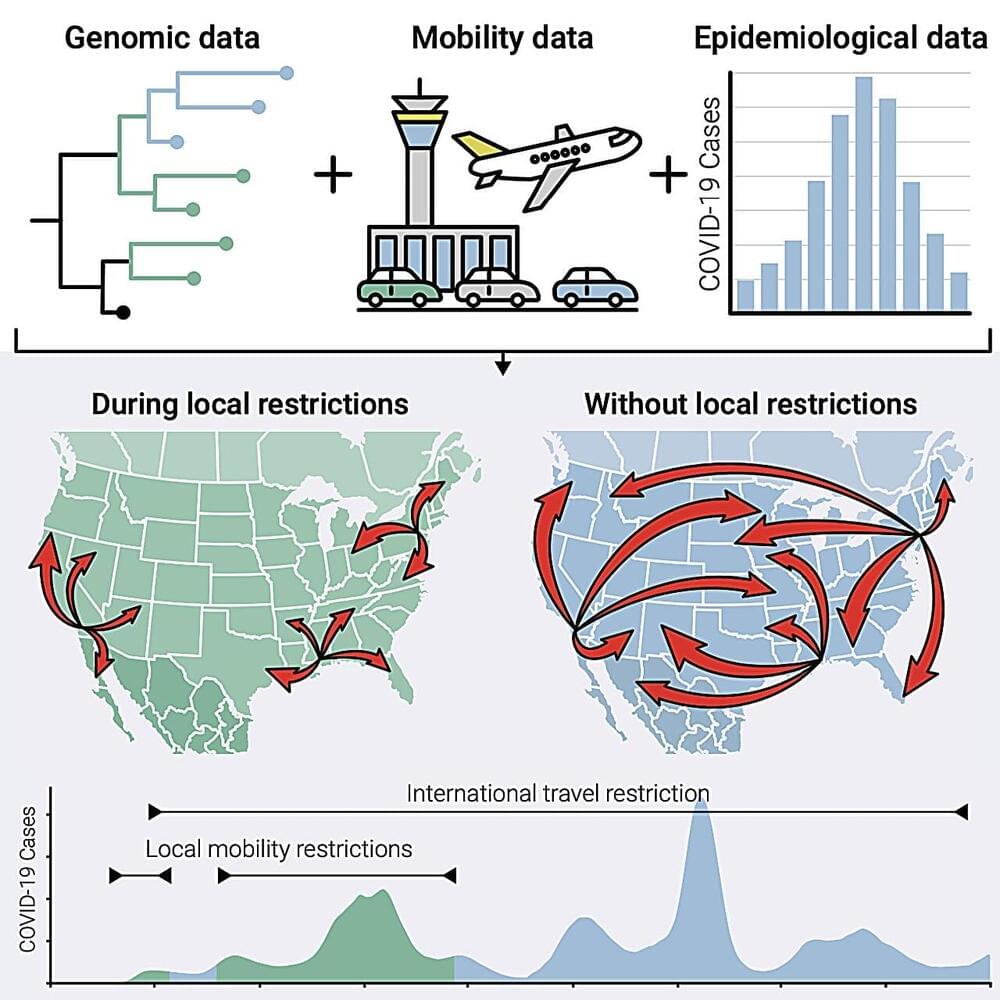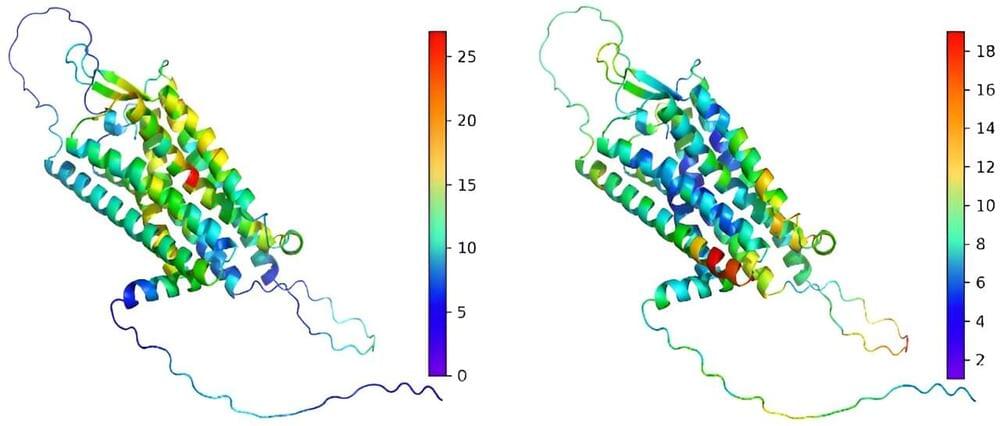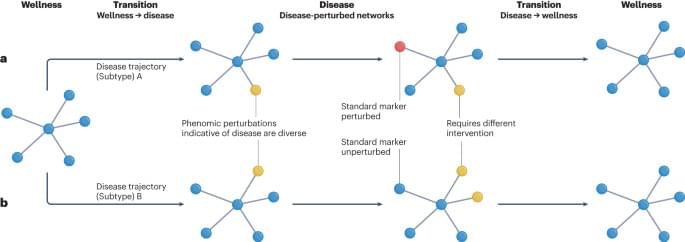Welcome for another episode of Health Theory! This episode promises to deliver a riveting conversation with the master of fitness, Andy Galpin. Andy is not just your average exercise physiologist, professor, and researcher. He’s a true powerhouse with a trademark ability to seamlessly bridge the gap between academic knowledge and real-world application.
Category: health – Page 153

Vertex’s First Crispr Gene Editing Therapy Gets EU Backing
Europe’s health regulator followed the US and UK in backing the first gene-editing therapy to use Crispr technology, a Vertex Pharmaceuticals Inc. and Crispr Therapeutics AG treatment for sickle cell disease.
The European Medicines Agency’s expert panel recommended on Friday authorizing the Vertex and Crispr drug, Casgevy, for people with severe sickle cell disease and another serious hereditary blood disorder, beta-thalassemia, which is traditionally treated with repeated transfusions. Vertex said before the ruling that it had yet to establish a European list price for the one-time therapy, which costs $2.2 million in the US.
The treatment makes precisely targeted changes in patients’ DNA, a months-long process that requires removing bone marrow and a stem cell transplant. In Europe, Vertex said its initial focus will be on countries with the highest numbers of patients, including France, Italy, the UK and Germany.

Dictionary.com 2023 Word Of The Year ‘Hallucinate’ Is An AI Health Issue
Bad things can happen when you hallucinate. If you are human, you can end up doing things like putting your underwear in the oven. If you happen to be a chatbot or some other type of artificial intelligence (AI) tool, you can spew out false and misleading information, which—depending on the info—could affect many, many people in a bad-for-your-health-and-well-being type of way. And this latter type of hallucinating has become increasingly common in 2023 with the continuing proliferation of AI. That’s why Dictionary.com has an AI-specific definition of “hallucinate” and has named the word as its 2023 Word of the Year.
Dictionary.com noticed a 46% jump in dictionary lookups for the word “hallucinate” from 2022 to 2023 with a comparable increase in searches for “hallucination” as well. Meanwhile, there was a 62% jump in searches for AI-related words like “chatbot”, “GPT”, “generative AI”, and “LLM.” So the increases in searches for “hallucinate” is likely due more to the following AI-specific definition of the word from Dictionary.com rather than the traditional human definition:
hallucinate [ h uh-loo-s uh-neyt ]-verb-(of artificial i ntelligence) to produce false information contrary to the intent of the user and present it as if true and factual. Example: When chatbots hallucinate, the result is often not just inaccurate but completely fabricated.
Here’s a non-AI-generated new flash: AI can lie, just like humans. Not all AI, of course. But AI tools can be programmed to serve like little political animals or snake oil salespeople, generating false information while making it seem like it’s all about facts. The difference from humans is that AI can churn out this misinformation and disinformation at even greater speeds. For example, a study published in JAMA Internal Medicine last month showed how OpenAI’s GPT Playground could generate 102 different blog articles “that contained more than 17,000 words of disinformation related to vaccines and vaping” within just 65 minutes. Yes, just 65 minutes. That’s about how long it takes to watch the TV show 60 Minutes and then make a quick uncomplicated bathroom trip that doesn’t involve texting on the toilet. Moreover, the study demonstrated how “additional generative AI tools created an accompanying 20 realistic images in less than 2 minutes.

Healthcare providers to join US plan to manage AI risks
WASHINGTON, Dec 14 (Reuters) — Twenty-eight healthcare companies, including CVS Health (CVS.N), are signing U.S. President Joe Biden’s voluntary commitments aimed at ensuring the safe development of artificial intelligence (AI), a White House official said on Thursday.
The commitments by healthcare providers and payers follow those of 15 leading AI companies, including Google, OpenAI and OpenAI partner Microsoft (MSFT.O) to develop AI models responsibly.
Biden’s government is pushing to set parameters around AI as it makes rapid gains in capability and popularity while regulation remains limited.

Social distancing was more effective at preventing local COVID-19 transmission than international border closures
Elucidating human contact networks could help predict and prevent the transmission of SARS-CoV-2 and future pandemic threats. A new study from Scripps Research scientists and collaborators points to which public health protocols worked to mitigate the spread of COVID-19—and which ones didn’t.
In the study, published online in Cell on December 14, 2023, the Scripps Research-led team of scientists investigated the efficacy of different mandates—including stay-at-home measures, social distancing and travel restrictions —at preventing local and regional transmission during different phases of the COVID-19 pandemic.
They found that local transmission was driven by the amount of travel between locations, not by how geographically nearby they were. The study also revealed that the partial closure of the U.S.-Mexico border was ineffective at preventing cross-border transmission of the virus. These findings, in combination with ongoing genomic surveillance, could help guide public health policy to prevent future pandemics and mitigate the new “endemic” phase of COVID-19.

Unlocking the human genome: Innovative machine learning tool predicts functional consequences of genetic variants
In a novel study, researchers from the Icahn School of Medicine at Mount Sinai have introduced LoGoFunc, an advanced computational tool that predicts pathogenic gain and loss-of-function variants across the genome.
Unlike current methods that predominantly focus on loss of function, LoGoFunc distinguishes among different types of harmful mutations, offering potentially valuable insights into diverse disease outcomes. The findings are described in Genome Medicine.
Genetic variations can alter protein function, with some mutations boosting activity or introducing new functions (gain of function), while others diminish or eliminate function (loss of function). These changes can have significant implications for human health and the treatment of disease.
Extending the uncertainty principle by using an unbounded operator
A study published in the journal Physical Review Letters by researchers in Japan solves a long-standing problem in quantum physics by redefining the uncertainty principle.
Werner Heisenberg’s uncertainty principle is a key and surprising feature of quantum mechanics, and he can thank his hay fever for it. Miserable in Berlin in the summer of 1925, the young German physicist vacationed on the remote, rocky island of Helgoland, in the North Sea off the northern German coast. His allergies improved, and he was able to continue his work trying to understand the intricacies of Bohr’s model of the atom, developing tables of internal atomic properties, such as energy, position and momentum.
When he returned to Göttingen, his advisor, Max Born, recognized these tables could each be formed into a matrix—essentially a two-dimensional table of values. Together with the 22-year-old Pasqual Jordan, they refined their work into matrix mechanics—the first successful theory of quantum mechanics—the physical laws that describe tiny objects like atoms and electrons.

The transition from genomics to phenomics in personalized population health
This Perspective reviews large-scale genomics and longitudinal phenomics efforts and the insights they can provide into wellness. The authors describe their vision for the transformation of the current health care from disease-oriented to data-driven, wellness-oriented and personalized population health.
The future of intelligence: artificial, natural, and combined
Twenty-four years ago, Ray Kurzweil predicted computers would reach human-level intelligence by 2029. This was met with great concern and criticism. In the past six months technology experts have come around to agree with him. According to Kurzweil, over the next two decades, AI is going to change what it means to be human. We are going to invent new means of expression that will soar past human language, art, and science of today. All of the concepts that we rely on to give meaning to our lives, including death itself, will be transformed.\
\
Speakers:\
Ray Kurzweil\
Inventor, Futurist \& Best-selling author of ‘The Singularity is Near’\
\
Reinhard Scholl\
Deputy Director, Telecommunication Standardization Bureau\
International Telecommunication Union (ITU)\
Co-founder and Managing Director, AI for Good\
\
The AI for Good Global Summit is the leading action-oriented United Nations platform promoting AI to advance health, climate, gender, inclusive prosperity, sustainable infrastructure, and other global development priorities. AI for Good is organized by the International Telecommunication Union (ITU) – the UN specialized agency for information and communication technology – in partnership with 40 UN sister agencies and co-convened with the government of Switzerland.\
\
Join the Neural Network!\
👉https://aiforgood.itu.int/neural-netw…\
The AI for Good networking community platform powered by AI. \
Designed to help users build connections with innovators and experts, link innovative ideas with social impact opportunities, and bring the community together to advance the SDGs using AI.\
\
🔴 Watch the latest #AIforGood videos!\
/ aiforgood \
\
📩 Stay updated and join our weekly AI for Good newsletter:\
http://eepurl.com/gI2kJ5\
\
🗞Check out the latest AI for Good news:\
https://aiforgood.itu.int/newsroom/\
\
📱Explore the AI for Good blog:\
https://aiforgood.itu.int/ai-for-good…\
\
🌎 Connect on our social media:\
Website: https://aiforgood.itu.int/\
Twitter: / aiforgood \
LinkedIn Page: / 26,511,907 \
LinkedIn Group: / 8,567,748 \
Instagram: / aiforgood \
Facebook: / aiforgood \
\
What is AI for Good?\
We have less than 10 years to solve the UN SDGs and AI holds great promise to advance many of the sustainable development goals and targets.\
More than a Summit, more than a movement, AI for Good is presented as a year round digital platform where AI innovators and problem owners learn, build and connect to help identify practical AI solutions to advance the United Nations Sustainable Development Goals.\
AI for Good is organized by ITU in partnership with 40 UN Sister Agencies and co-convened with Switzerland.\
\
Disclaimer:\
The views and opinions expressed are those of the panelists and do not reflect the official policy of the ITU.

Stroke — Health Video: MedlinePlus Medical Encyclopedia
A stroke happens when blood flow is lost to part of the brain. Your brain cells cannot get the oxygen and nutrients they need from blood, and they start to die in a few minutes. This can cause lasting brain damage, long-term disability, or even death.
A stroke can occur when an obstruction such as a blood clot travels from another part of the body and lodges inside an artery in the brain.
When an arterial wall becomes damaged, various types of emboli, or obstructions, can form. Emboli can be made up of various substances such as platelets, elements in the blood that help it clot, blood clots that form elsewhere and pass to the damaged area, cholesterol, or a combination of things.
For example, an embolism is formed in the carotid artery and breaks loose, traveling towards the brain where it will eventually lodge, blocking the blood the brain needs. The blocked artery deprives the brain of oxygen, which cause damage to the surrounding tissue. The result is a stroke.